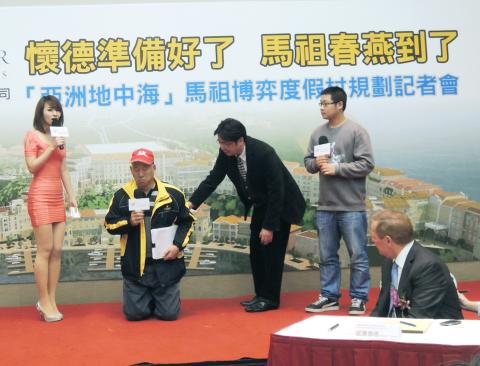An international developer bidding to build a casino resort on Matsu yesterday said it has budgeted US$2.5 billion to construct supporting infrastructure.
This will remove the biggest obstacle facing Matsu’s development: a lack of transportation infrastructure, Weidner Resorts chairman and CEO William Weidner said.
The money would be used mainly to upgrade Beigan Airport so that it can handle larger aircraft such as Airbus SAS’ A320s and Boeing Co’s 747s, Weidner said.

Photo: Tsai Wei-chi, Taipei Times
A bridge connecting the Matsu chain’s Beigan and Nangan islands, a ferry harbor and a yacht terminal would also be built, he said.
“[The project] will develop Matsu’s infrastructure and help connect it to the rest of the world,” Weidner said.
He said that the US$2.5 billion, which is part of the US$8 billion in funds for the entire project, came from Bank of America, Deutsche Bank, JPMorgan and Credit Suisse.
Weidner said the resort could generate 70,000 job opportunities.
Matsu County residents approved a referendum in July last year allowing casinos to be built on the island chain.
However, such projects cannot proceed until a bill governing the operation of casinos is passed by the legislature.
The Cabinet is currently working on drafting legislation toward that end.

STEEP DECLINE: Yesterday’s drop was the third-steepest in its history, the steepest being Monday’s drop in the wake of the tariff announcement on Wednesday last week Taiwanese stocks continued their heavy sell-off yesterday, as concerns over US tariffs and unwinding of leveraged bets weighed on the market. The benchmark TAIEX plunged 1,068.19 points, or 5.79 percent, to 17,391.76, notching the biggest drop among Asian peers as it hit a 15-month low. The decline came even after the government on late Tuesday authorized the NT$500 billion (US$15.2 billion) National Stabilization Fund (國安基金) to step in to buoy the market amid investors’ worries over tariffs imposed by US President Donald Trump. Yesterday’s decline was the third-steepest in its history, trailing only the declines of 2,065.87 points on Monday and

TAKING STOCK: A Taiwanese cookware firm in Vietnam urged customers to assess inventory or place orders early so shipments can reach the US while tariffs are paused Taiwanese businesses in Vietnam are exploring alternatives after the White House imposed a 46 percent import duty on Vietnamese goods, following US President Donald Trump’s announcement of “reciprocal” tariffs on the US’ trading partners. Lo Shih-liang (羅世良), chairman of Brico Industry Co (裕茂工業), a Taiwanese company that manufactures cast iron cookware and stove components in Vietnam, said that more than 40 percent of his business was tied to the US market, describing the constant US policy shifts as an emotional roller coaster. “I work during the day and stay up all night watching the news. I’ve been following US news until 3am

Six years ago, LVMH’s billionaire CEO Bernard Arnault and US President Donald Trump cut the blue ribbon on a factory in rural Texas that would make designer handbags for Louis Vuitton, one of the world’s best-known luxury brands. However, since the high-profile opening, the factory has faced a host of problems limiting production, 11 former Louis Vuitton employees said. The site has consistently ranked among the worst-performing for Louis Vuitton globally, “significantly” underperforming other facilities, said three former Louis Vuitton workers and a senior industry source, who cited internal rankings shared with staff. The plant’s problems — which have not

TARIFF CONCERNS: The chipmaker cited global uncertainty from US tariffs and a weakening economic outlook, but said its Singapore expansion remains on track Vanguard International Semiconductor Corp (世界先進), a foundry service provider specializing in producing power management and display driver chips, yesterday withdrew its full-year revenue projection of moderate growth for this year, as escalating US tariff tensions raised uncertainty and concern about a potential economic recession. The Hsinchu-based chipmaker in February said revenues this year would grow mildly from last year based on improving supply chain inventory levels and market demand. At the time, it also anticipated gradual quarter revenue growth. However, the US’ sweeping tariff policy has upended the industry’s supply chains and weakened economic prospects for the world economy, it said. “Now